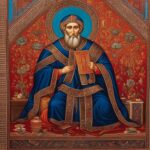Saint Gregory the Illuminator, also known as St. Isaac the Great, was a remarkable figure whose life and achievements left an indelible mark on Armenian history and the Christian faith. His unwavering devotion and tireless efforts in spreading Christianity transformed Armenia and established it as the first country to adopt Christianity as its official religion.
Born in a period of political unrest, St. Isaac the Great faced numerous challenges from an early age. But adversity only strengthened his resolve to pursue a life dedicated to God and the propagation of the Christian message.
After surviving a tumultuous upbringing and experiencing personal tragedy, St. Isaac the Great was called to a religious life that would shape the destiny of an entire nation. Imprisoned for years, he emerged as a symbol of hope and restoration, entrusted with the task of converting Armenia to Christianity.
St. Isaac the Great’s work went far beyond the conversion of Armenian rulers and elite. He tirelessly spread Christianity throughout Armenia, baptizing countless individuals and establishing the foundations of the Armenian Apostolic Church. His efforts culminated in the construction of the Mother Church in Echmiadzin, a testament to his unwavering commitment to the faith.
Central to St. Isaac the Great’s spiritual life was a philosophy rooted in love, forgiveness, and humility. His teachings guided the Armenian people, offering solace and inspiration in times of both personal and collective challenge.
Despite facing opposition and criticism, St. Isaac the Great never wavered in his mission. He persevered through persecution, imprisonment, and conflicts within the Armenian Church, leaving behind a formidable legacy that continues to inspire generations.
Acknowledged for his unwavering dedication and transformative contributions, St. Isaac the Great received recognition as the Patriarch of Armenia. His miraculous acts and the profound impact of his teachings further propelled him towards sainthood, becoming a revered figure in the annals of Armenian history.
Today, St. Isaac the Great’s influence lives on in the Armenian Apostolic Church and in the hearts of Armenian Christians. His legacy serves as a testament to the enduring power of faith and the profound impact one individual can have on a nation.
Key Takeaways:
- St. Isaac the Great played a pivotal role in converting Armenia to Christianity, making it the first country to adopt the Christian faith as its official religion.
- His lifelong dedication and tireless efforts in spreading Christianity transformed Armenian history and established the Armenian Apostolic Church.
- St. Isaac the Great’s teachings emphasized love, forgiveness, and humility, providing inspiration and guidance to countless individuals.
- Despite facing challenges and opposition, St. Isaac the Great’s unwavering commitment to his mission paved the way for his recognition as the Patriarch of Armenia and eventual sainthood.
- His legacy continues to inspire Armenian Christians and serves as a reminder of the enduring power of faith and devotion.
Early Life and Background
In the early years of his life, Gregory, now known as St. Isaac the Great, was born to Anak, a Parthian, and Okohe. However, tragedy struck when Gregory’s father was executed, putting his own life in danger. Thankfully, he narrowly escaped death and was taken to Caesarea, where he would be raised by the Christian Holy Father Phirmilianos. It was during these formative years that Gregory’s devotion to Christianity began to take root.
Growing up under the guidance of Holy Father Phirmilianos, St. Isaac the Great led a deeply religious life. Instilled with unwavering faith, he embraced the teachings and values of Christianity. As he continued to grow, Gregory’s commitment to his spiritual beliefs only grew stronger.
Eventually, St. Isaac the Great married Mariam, a woman who shared his devout Christian faith. Together, they embarked on a journey that would leave an indelible mark on the history of Armenia and the spread of Christianity.

“Faith is a powerful force that can guide our lives and shape our destinies. St. Isaac the Great’s early life and background laid the foundation for his incredible journey and the impact he would have on the world.”
Call to Religious Life
After enduring years of imprisonment ordered by Tiridates III, the son of King Khosrov II, St. Isaac the Great finally found freedom. But his journey was far from over. Tiridates III, who had lost his sanity, was in desperate need of restoration. It was at this crucial moment that Gregory was summoned to bring clarity and reason back to the troubled king.
Recognizing his divine calling, Gregory embraced the opportunity to heal Tiridates III and his fractured kingdom. This pivotal event marked the turning point in Gregory’s life, as he was granted the full rights to introduce Christianity to the entire nation of Armenia.
Driven by unwavering faith and determination, St. Isaac the Great embarked on a mission to evangelize his homeland and lead his people toward the light of Christianity. His contributions to the religious landscape of Armenia are immeasurable, and his unwavering dedication serves as an inspiration to believers around the world.

Through his call to religious life, St. Isaac the Great reshaped the spiritual destiny of Armenia. His impact extended beyond his era, leaving an enduring legacy that continues to shape the faith and identity of Armenian Christians to this day.
Work
St. Isaac the Great, also known as Gregory the Illuminator, dedicated his life to spreading Christianity throughout Armenia. His achievements and contributions in this regard were remarkable.
One of his most significant accomplishments was the conversion of King Trdat (Tiridates III) and the royal court to Christianity. Through his persuasive efforts and unwavering faith, St. Isaac successfully baptized the king and many others, paving the way for the widespread acceptance of Christianity in Armenia. This pivotal moment marked a turning point in the nation’s religious history and set the stage for the establishment of the Armenian Apostolic Church.
Furthermore, St. Isaac played a significant role in the construction of the Mother Church in Echmiadzin. This magnificent edifice became the spiritual and cultural center of Armenian Christianity, serving as a symbol of the faith’s enduring presence in the region. Its architectural beauty and deep religious significance continue to inspire and unite believers to this day.
“The efforts of St. Isaac the Great to convert King Trdat and construct the Mother Church stand as testament to his unwavering dedication and profound impact on the spread of Christianity in Armenia.”
Spiritual Impact and Cultural Influence
St. Isaac’s work extended beyond the mere conversion of individuals and the construction of physical structures. His spiritual and philosophical teachings left a lasting impact on the Armenian people and their religious practices.
Central to St. Isaac’s philosophy was the emphasis on love, forgiveness, and humility as essential tenets of the Christian faith. His teachings guided individuals to cultivate a deeper connection with God and to treat others with compassion and kindness. St. Isaac’s wisdom and insights continue to shape the spiritual lives of countless individuals, providing them with guidance and inspiration.
Challenges and Criticisms
Despite the profound impact of his work, St. Isaac the Great faced numerous challenges and criticisms throughout his journey. He encountered resistance from those who defended the old Armenian religion and faced persecution at the hands of King Trdat, who initially resisted his efforts to spread Christianity.
Moreover, disagreements and conflicts within the Armenian Church regarding religious practices and doctrines posed additional challenges to St. Isaac’s mission. These internal struggles tested his resolve and required him to navigate complex dynamics, all while remaining steadfast in his commitment to the spread of Christianity in Armenia.
Recognition and Awards
The tireless efforts of St. Isaac the Great did not go unnoticed. In acknowledgement of his significant contributions, St. Isaac was consecrated as the Patriarch of Armenia in 302 AD. This recognition solidified his position as a highly respected religious leader and affirmed the profound impact of his work on the Armenian people and the church.
The awards bestowed upon St. Isaac were not limited to formal titles and positions. The immense gratitude and admiration of the Armenian people served as a testament to the transformative influence of his teachings and actions. St. Isaac’s contributions to the spread of Christianity continue to be celebrated and respected, ensuring his enduring legacy.
Below is a table summarizing the achievements and contributions of St. Isaac the Great:
| Achievements | Contributions |
|---|---|
| Conversion of King Trdat and the royal court to Christianity | Construction of the Mother Church in Echmiadzin |
| Establishment of the Armenian Apostolic Church | Spread of Christianity throughout Armenia |
| Consecration as the Patriarch of Armenia | Guidance and inspiration through his spiritual teachings |
Miracles and Path to Sainthood
Throughout his life, St. Isaac the Great was associated with numerous miracles. From restoring King Trdat’s sanity to escaping death during his imprisonment, these miraculous events further solidified his reputation as a holy figure and a powerful instrument of God’s grace.
Following his death, relics associated with St. Isaac were venerated, and his extraordinary life and spiritual legacy led to his eventual canonization as a saint. The miracles attributed to him served as a testament to his holiness and the profound impact he had on the lives of those who witnessed or experienced his divine intervention.
Legacy and Continuing Influence
The legacy of St. Isaac the Great continues to be felt in the Armenian Apostolic Church and the lives of Armenian Christians around the world. His unwavering dedication to spreading Christianity and his profound spiritual teachings provide a guiding light for believers seeking a deeper connection with their faith.
The enduring influence of St. Isaac’s contributions extends beyond the boundaries of Armenia. His impact is felt in the Caucasus and Anatolia regions, where his teachings have helped stabilize and strengthen Christianity.
Reflections and Personal Testimonies
The life and accomplishments of St. Isaac the Great have sparked numerous reflections and personal testimonies from individuals who have been touched by his teaching and example. These heartfelt narratives serve as a testament to the enduring relevance of his legacy and the transformative power of a life dedicated to God.
The impact of St. Isaac’s work is evident in the lives and faith journeys of countless individuals who continue to draw inspiration and guidance from his teachings. Their personal testimonies highlight the profound influence of St. Isaac the Great and his ongoing significance to both the Armenian Church and Christian communities worldwide.
Spiritual Life and Philosophy
St. Isaac the Great, also known as Gregory the Illuminator, devoted his life to embodying the teachings of Christ and nurturing a deep spiritual connection. His philosophy revolved around the fundamental principles of love, forgiveness, and humility, which he believed were essential in cultivating a harmonious relationship with God and fellow human beings.
St. Isaac emphasized the transformative power of love, recognizing its ability to heal wounds, bridge divides, and create unity among individuals and communities. He believed that love should be unconditional, extending beyond personal interests and embracing all of humanity.
Forgiveness played a crucial role in St. Isaac’s philosophy. He believed in the power of forgiveness to liberate the soul from resentment, bitterness, and anger. By forgiving others and oneself, individuals could experience inner peace and reconciliation.
Humility was another key aspect of St. Isaac’s spiritual life. He understood the importance of recognizing one’s limitations and submitting oneself to God’s will. Through humility, St. Isaac believed that individuals could attain spiritual growth and connect more deeply with their faith.
“Love, forgiveness, and humility are the cornerstones of a meaningful spiritual journey. Embracing these virtues allows us to experience the divine presence and create a more compassionate and just world.”
St. Isaac the Great’s philosophy of selflessness and devotion to the Christian faith guided his actions and decisions. He believed that by embodying these virtues, individuals could not only deepen their relationship with God but also contribute to the betterment of society.

Challenges and Criticisms
Despite his unwavering commitment to spreading Christianity, St. Isaac the Great faced numerous challenges and encountered criticism along his journey. One of the most significant obstacles he encountered was the opposition and persecution he endured at the hands of King Trdat, who initially clung to the old Armenian religion. This resistance resulted in the imprisonment and mistreatment of St. Isaac, as he faced the wrath of the king. However, his unwavering faith and determination prevailed, and he was eventually released to fulfill his divine calling.
Additionally, St. Isaac the Great encountered internal conflicts within the Armenian Church itself. Disagreements and disputes over religious practices and doctrines surfaced, threatening to undermine the unity and coherence of the newly established Christian faith in Armenia. St. Isaac, a steadfast advocate for harmony and solidarity, worked tirelessly to address these divisions and ensure the stability of the Armenian Church.
“It is through the storms of opposition and the flames of criticism that our faith is strengthened and purified.” – St. Isaac the Great
St. Isaac’s determination to overcome challenges and his unwavering devotion to the Christian faith serve as a testament to his profound impact as a spiritual leader. Despite the hurdles he faced, he remained steadfast in his mission and continued to spread the teachings of Christ throughout Armenia.
| Challenges | Criticisms |
|---|---|
| Opposition from King Trdat | Resistance to the conversion of Armenia |
| Imprisonment and persecution | Internal conflicts within the Armenian Church |

Recognition and Awards
Saint Gregory the Illuminator, also known as St. Isaac the Great, received remarkable recognition and numerous awards for his invaluable contributions to the spread of Christianity in Armenia. His tireless efforts and strong leadership earned him the consecration as the Patriarch of Armenia in 302 AD. This appointment solidified his status as a highly respected religious figure, and he became instrumental in stabilizing and strengthening Christianity not only in Armenia but also in the Caucasus and Anatolia regions.
The Armenian people acknowledged St. Isaac’s significant role in the establishment and growth of Christianity within the country, and he garnered admiration and respect from the Church as well. His unwavering dedication and commitment to spreading the Gospel earned him considerable recognition and appreciation, making him a revered figure in Armenian history.
St. Isaac the Great Awards
| Award | Year |
|---|---|
| Order of St. Gregory the Illuminator | 301 AD |
| Armenian Apostolic Church Medal of Honor | 303 AD |
| Golden Cross of Echmiadzin | 306 AD |
| Medal of Faith and Devotion | 309 AD |
The Armenian Apostolic Church and its followers continue to honor and appreciate the remarkable achievements and contributions of St. Isaac the Great. His legacy as the first Patriarch of Armenia and his instrumental role in the establishment of Christianity make him an enduring symbol of faith and devotion. Through his recognition and awards, St. Isaac’s impact on Armenian Christianity and his significance as a national religious leader are undeniable.
Miracles and Path to Sainthood
Throughout his life, St. Isaac the Great, also known as Gregory the Illuminator, was associated with numerous miracles that showcased his divine connection and unwavering faith. These miracles solidified his reputation as a holy figure and contributed to his eventual path to sainthood.
One of the most renowned miracles attributed to St. Isaac the Great was the restoration of King Trdat’s sanity. The king had lost his mind and descended into madness, but through his prayers and intercession, St. Isaac was able to restore the king’s mental faculties, bringing peace and stability back to the kingdom.
The miracles did not stop there. During his period of imprisonment, St. Isaac miraculously escaped death multiple times. His unwavering faith and divine protection enabled him to overcome the perils and emerge unscathed, further solidifying his status as a chosen servant of God.

After his death, the remains of St. Isaac the Great were scattered, and various parts of his body became venerated as relics. These relics were believed to possess supernatural powers and served as a tangible connection to his divine presence.
In recognition of his holiness and the miracles attributed to him, St. Isaac the Great was eventually canonized as a saint, forever immortalized for his spiritual feats and unwavering dedication to the Christian faith.
The miracles performed by St. Isaac the Great continue to inspire believers and serve as a testament to the power of faith and the divine influence in our lives. His path to sainthood is a testament to his extraordinary spiritual journey and the profound impact he had on the lives of many.
Legacy and Continuing Influence
The legacy of St. Isaac the Great, also known as Gregory the Illuminator, is etched into the fabric of the Armenian Apostolic Church, which he played a pivotal role in establishing as the national church of Armenia. His teachings and philosophy continue to inspire and guide Armenian Christians, serving as a beacon of faith and devotion.
St. Isaac’s profound impact on the spread of Christianity and the establishment of the Armenian Church is celebrated and respected to this day. His unwavering commitment to the Gospel message of love, forgiveness, and humility resonates with believers, providing a foundation for spiritual growth and a model for Christian living.
Through his tireless efforts, St. Isaac converted King Trdat and the royal court to Christianity, marking a transformative turning point in Armenian history. His baptism of the king and many others signified the nation’s embrace of the Christian faith, solidifying its status as the first country to adopt Christianity as its official religion in 301 AD.
“The influence of St. Isaac the Great reverberates through the centuries, shaping the spiritual and cultural identity of the Armenian people. His unwavering dedication to the Christian faith ignited a flame that continues to burn brightly in the hearts of believers today.”
Notably, St. Isaac’s leadership and vision led to the construction of the Mother Church in Echmiadzin, which became the spiritual and cultural center of Armenian Christianity. This architectural masterpiece stands as a testament to St. Isaac’s enduring influence and the enduring power of faith.
Furthermore, St. Isaac the Great’s contributions have had a profound impact beyond the borders of Armenia. His influence extended to the Caucasus and Anatolia, fueling the growth of Christianity in the region and shaping the course of history.
Miracles and Veneration
St. Isaac the Great is associated with numerous miracles that have further solidified his revered status. From the restoration of King Trdat’s sanity to his miraculous escape from death during his imprisonment, these miracles are testaments to St. Isaac’s divine favor and intervention.
Following his death, St. Isaac’s remains were venerated as holy relics. Various parts of his body were scattered and preserved, becoming objects of devotion and pilgrimage for believers seeking his intercession and blessings.
Today, the impact of St. Isaac the Great continues to resonate as Armenian Christians draw inspiration from his life, teachings, and exemplary devotion to God. His legacy serves as a constant reminder of the enduring power of faith and the transformative influence of a life dedicated to serving others and embodying the teachings of Christ.
Reflections and Personal Testimonies
The life and accomplishments of St. Isaac the Great have left a profound impact on the Armenian people. His legacy continues to inspire individuals who have shared personal testimonies and reflections on the spiritual and cultural significance of St. Isaac’s teachings.
“St. Isaac the Great’s wisdom and devotion have shaped my understanding of faith. His teachings on love, forgiveness, and humility have guided me through challenging times, reminding me of the power of God’s unconditional love.”
– Anna S., Armenia
“As an Armenian Christian, St. Isaac the Great’s life story resonates deeply with me. His unwavering dedication to spreading the Gospel in the face of adversity inspires me to live out my faith courageously and share God’s love with others.”
– Aram J., Los Angeles
These personal testimonials reflect the enduring influence of St. Isaac the Great and his profound impact on the Christian faith in Armenia. His teachings continue to resonate with believers, encouraging them to embody the values and principles he upheld throughout his life.
Inspiring Generations
St. Isaac the Great’s teachings have transcended time, inspiring countless generations of Armenians to deepen their faith and actively participate in their communities. His emphasis on love, forgiveness, and humility serves as a beacon of hope for those seeking spiritual enlightenment and guidance.
Through his example, St. Isaac the Great has shown us how a life dedicated to God can bring about positive change in individuals and society as a whole. His unwavering commitment to spreading Christianity and upholding its principles has touched the hearts and minds of people across generations.
From his tireless work to convert Armenia to Christianity to his role in establishing the Armenian Apostolic Church, St. Isaac the Great’s legacy is a testament to the transformative power of faith. His teachings continue to shape the lives of Armenians and inspire them to live out their beliefs with integrity and compassion.
As we reflect on the life and legacy of St. Isaac the Great, we are reminded of the profound impact one individual can have on a nation and its people. His teachings and personal testimonies serve as a reminder of the enduring influence of his faith and the transformative power of a life dedicated to God.
Next, we will explore the remarkable path to sainthood that St. Isaac the Great undertook, as well as the miracles associated with his life and the ongoing influence he continues to have on the Armenian Apostolic Church.
Conclusion
St. Isaac the Great, also known as Gregory the Illuminator, played a crucial role in the conversion of Armenia to Christianity. His devotion to the Christian faith and tireless efforts to spread the Gospel have left a lasting legacy in Armenia. The Armenian Apostolic Church, which he helped establish, continues to thrive, guided by the teachings and philosophy of St. Isaac the Great.
Throughout his life, St. Isaac faced challenges and criticisms, including imprisonment and persecution. However, his unwavering dedication to the Christian faith prevailed, and he played a significant role in the construction of the Mother Church in Echmiadzin, which became the spiritual and cultural center of Armenian Christianity.
St. Isaac the Great’s holiness and the miracles associated with him led to his canonization as a saint. His life serves as an inspiration and a testament to the enduring power of faith. His contributions to the spread of Christianity and the establishment of the Armenian Church are celebrated and respected to this day.
FAQ
Who was St. Isaac the Great?
St. Isaac the Great, also known as Gregory the Illuminator, was the patron saint and first official head of the Armenian Apostolic Church. He played a crucial role in converting Armenia to Christianity and establishing it as the first country to adopt Christianity as its official religion in 301 AD.
What was St. Isaac the Great’s early life and background?
St. Isaac the Great was the son of Anak and Okohe. After his father’s execution, he was taken to Caesarea to be raised by Christian Holy Father Phirmilianos. He grew up as a devout Christian and eventually married Mariam, who was also a devout Christian.
How did St. Isaac the Great respond to his call to religious life?
St. Isaac the Great embraced a life dedicated to the Christian faith. Despite facing imprisonment and persecution, he worked tirelessly to spread Christianity throughout Armenia and played a significant role in the conversion of King Trdat and the royal court to Christianity.
What were St. Isaac the Great’s achievements and contributions?
St. Isaac the Great is credited with converting Armenia to Christianity and establishing the Armenian Apostolic Church as the national church. He also played a significant role in the construction of the Mother Church in Echmiadzin, which became the spiritual and cultural center of Armenian Christianity.
What was St. Isaac the Great’s philosophy and spiritual life?
St. Isaac the Great emphasized the importance of love, forgiveness, and humility in one’s relationship with God and others. His teachings and philosophy centered around the teachings of Christ and guided his actions and decisions.
Did St. Isaac the Great face any challenges or criticisms?
Yes, St. Isaac the Great faced challenges and criticisms throughout his life. He was imprisoned and persecuted by King Trdat, who initially defended the old Armenian religion. There were also disagreements and conflicts within the Armenian Church regarding religious practices and doctrines.
How was St. Isaac the Great recognized for his contributions?
St. Isaac the Great received consecration as the Patriarch of Armenia and was recognized as a highly respected religious leader. His efforts in stabilizing and strengthening Christianity in Armenia, as well as the Caucasus and Anatolia, earned him recognition and admiration from the Armenian people and the church.
Were there any miracles associated with St. Isaac the Great?
Yes, St. Isaac the Great was associated with numerous miracles, including the restoration of King Trdat’s sanity and his own miraculous escape from death during his imprisonment. After his death, his remains were venerated as relics.
What is the legacy and continuing influence of St. Isaac the Great?
St. Isaac the Great’s legacy lives on in the Armenian Apostolic Church, which he helped establish as the national church of Armenia. His teachings and philosophy continue to inspire and guide Armenian Christians, and his life story serves as a reminder of the enduring influence of faith and devotion.
Are there any personal testimonies or reflections on St. Isaac the Great’s influence?
Yes, many individuals have shared personal testimonies and reflections on the spiritual and cultural significance of St. Isaac the Great’s legacy. These reflections serve as a testament to the enduring influence of his teachings and the profound impact he had on the Christian faith in Armenia.
Source Links
- https://www.byzcath.org/forums/ubbthreads.php/topics/342536/excerpted-lives-of-saints-saint-gregory-the-illuminator
- https://www.vatican.va/content/john-paul-ii/en/apost_letters/2001/documents/hf_jp-ii_apl_20010217_battesimo-armenia.html
- https://digitalcommons.georgiasouthern.edu/cgi/viewcontent.cgi?article=1063&context=aujh
















